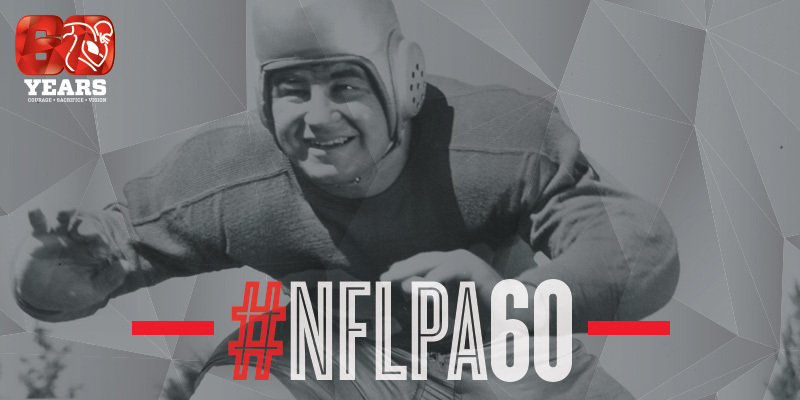60 Heroes: The Father of Sports Labor Action

When discussing the history of sports law, the name “Bill Radovich” is almost always at the forefront. At a time when there was no players union or legal fund, the former Detroit Lions offensive lineman fearlessly became the first former player to take the NFL to court over the abuse of its monopoly powers. Radovich’s victory in 1957 helped pave the way for the NFLPA’s enduring fight for free agency and player rights over the last 60 years.
Standing at just 5 feet 8 inches and 161 pounds, Radovich quickly developed a reputation as a scrappy guard who would not back down from anyone. As a player, that attitude helped make him an NFL all-star in 1939 and 1945 with the Lions. Following his first stint with Detroit from 1938-1941, he entered the Navy and served until the end of World War II in 1945.
Upon returning to the field in 1945, he compiled a second all-star campaign with the Lions but his mind was on his ailing father in California. In order to be closer to family and maximize his earnings during the final years of his playing career, Radovich asked the Lions to trade him to a West Coast team or give him a pay raise so he could travel to see his father more. Both requests were shot down by Detroit owner Fred Madel Jr., who also threatened to blacklist Radovich if he tried playing in another league.
Adamant that his rights were being infringed upon, Radovich accepted an offer to play with the San Francisco Dons in the All-American Football Conference (AAFC), a new league that lured in a number of NFL veterans with its higher salaries. Radovich played two seasons with the Dons in 1946 and 1947, where he made $300 per contest during the 12-game campaign.
He was then offered a job as a player-coach with the San Francisco Clippers, a minor league team affiliated with the NFL. But soon after, the Seals suddenly took the deal off the table. Radovich had indeed been blacklisted.
In turn, the pioneer sued the NFL in 1949, only to have the case dismissed by a lower court. Eight years later, however, the Supreme Court ruled in favor of Radovich, 6-3, saying that, unlike professional baseball, the NFL was subject to antitrust laws. The Court ordered that the case be retried, but at the urging of his lawyer, Radovich ultimately settled with the NFL for $42,500.
The landmark ruling not only resonated during future labor battles between the NFL and NFLPA but also in other sports. For instance, when challenging baseball’s reserve clause in the 1960s, Marvin Miller, then-executive director of the Major League Baseball Players Association, cited the Court’s statement from the Radovich case that baseball’s long-standing exemption from antitrust laws was “unreasonable, illogical and inconsistent.”
Known to some as the “father of sports labor action,” Radovich, who passed away in 2002, was able to see the gains made and doors opened by his enduring fight for player rights, making him a forerunner for the NFLPA and other sports unions.